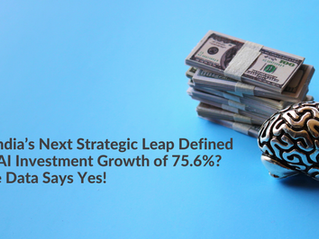AI in chemical lifecycle assessment: A New Era of Sustainable Intelligence
- Saktishree DM

- Sep 5, 2025
- 3 min read
Updated: Sep 7, 2025

The chemical industry is under increasing pressure to reduce its environmental footprint while maintaining profitability and innovation. From raw material extraction to end-of-life disposal, every stage of a chemical product’s lifecycle carries ecological consequences. Lifecycle Assessment (LCA) has long been the gold standard for quantifying these impacts-but traditional LCA methods are often time-consuming, data-intensive, and static.
Enter Artificial Intelligence (AI): a transformative force that is revolutionizing how chemical companies conduct LCAs, enabling faster, more accurate, and scalable assessments. AI doesn’t just automate-it augments decision-making, helping firms move from reactive compliance to proactive sustainability strategy.
🧠 What Is Lifecycle Assessment (LCA) in Chemicals?
LCA is a structured methodology for evaluating the environmental impacts of a product or process across its entire lifecycle:
Raw material extraction
Production and synthesis
Distribution and use
End-of-life (disposal, recycling, incineration)
In chemicals, this includes tracking:
Energy and water usage
Emissions and waste
Toxicity and persistence
Supply chain risks
The goal is to identify “hotspots” and optimize processes to reduce environmental harm.
🤖 How AI Enhances Chemical LCA
AI transforms LCA from a static report into a dynamic, predictive, and scalable tool. Here’s how:
1. Automated Data Collection
AI algorithms can scrape, clean, and integrate data from:
Internal ERP systems
Supplier databases
Public LCA repositories (e.g., ecoinvent, GaBi)
This eliminates manual data entry and improves completeness.
2. Emission Factor Matching
AI can automatically match chemical processes to accurate emission factors, improving precision in carbon footprint calculations.
3. Predictive Modeling
Machine learning models can simulate environmental impacts of:
New chemical formulations
Process changes
Alternative feedstocks
This enables scenario analysis before implementation.
4. Supply Chain Mapping
AI can trace upstream and downstream impacts across complex supply chains, identifying hidden risks and opportunities.
5. Real-Time Optimization
AI-powered platforms can provide live feedback on sustainability metrics, allowing engineers to tweak parameters during production.
🌍 Real-World Example: BASF and Makersite
One of the most compelling examples comes from BASF, a global leader in chemicals, which partnered with Makersite, an AI-driven LCA platform.
The Challenge
BASF needed to assess the environmental impact of thousands of chemical products across global operations, each with unique formulations, suppliers, and production routes.
The Solution
Using Makersite’s AI-powered platform, BASF was able to:
Automate LCA data collection across its portfolio
Simulate cradle-to-grave impacts for new products
Identify hotspots in energy use and emissions
Optimize product design for sustainability
The Impact
LCA time reduced from weeks to hours
Improved accuracy and transparency
Enabled eco-design and green chemistry initiatives
Strengthened ESG reporting and compliance
This case illustrates how AI can scale sustainability across a complex chemical enterprise.
🧩 Strategic Benefits for Chemical Firms
Benefits | Description |
Speed | AI reduces LCA turnaround time from weeks to hours |
Accuracy | Machine learning improves data quality and consistency |
Scalability | Enables LCA across thousands of SKUs and suppliers |
Innovation | Supports eco-design and green chemistry |
Compliance | Facilitates reporting for EU taxonomy, CSRD, and SEC climate rules |
🛠 Tools and Platforms to Watch
Makersite: AI-powered LCA and product intelligence
CarbonBright: Emission factor automation and real-time insights
Sphera: Enterprise sustainability and risk management
OpenLCA + AI plugins: Open-source LCA with machine learning extensions
These platforms are increasingly integrating natural language processing, graph analytics, and predictive modeling to enhance LCA workflows.
🚧 Challenges and Considerations
Despite its promise, AI in LCA comes with hurdles:
Data availability: Many chemical processes lack granular environmental data
Model transparency: Black-box AI models may raise trust issues
Regulatory alignment: AI-generated LCAs must comply with ISO 14040/44 standards
Skill gaps: Chemical engineers may need training in AI tools
Consultants must help clients bridge these gaps through tailored strategies, training, and governance frameworks.
🧭 Consulting Framework: AI-Driven LCA Strategy
For firms looking to adopt AI in chemical LCA, here’s a strategic roadmap:
1. Assessment
Audit current LCA processes and data sources
Identify bottlenecks and improvement areas
2. Tool Selection
Choose AI platforms aligned with chemical workflows
Ensure compatibility with regulatory standards
3. Data Integration
Connect internal systems (ERP, PLM) with AI tools
Establish data governance protocols
4. Pilot Projects
Run AI-driven LCAs on select products
Validate results against traditional methods
5. Scale and Optimize
Roll out across product lines and geographies
Use insights to inform R&D, procurement, and marketing
💡 Future Outlook: AI + LCA + Circular Chemistry
The next frontier is integrating AI-driven LCA with circular economy principles.
Imagine:
AI identifying recyclable feedstocks
Predicting end-of-life recovery rates
Optimizing reverse logistics for chemical reuse
This convergence will enable closed-loop systems, reducing waste and maximizing resource efficiency.
Conclusion: Intelligence for Impact
AI is not just a tool, it’s a strategic enabler for sustainable transformation in the chemical industry. By embedding AI into lifecycle assessment, companies can move beyond compliance to innovation, resilience, and leadership. For consultants, this opens up new avenues to guide clients through digital sustainability, helping them turn data into decisions-and decisions into impact.







Wow, this is a good one. AI is disrupting all ...